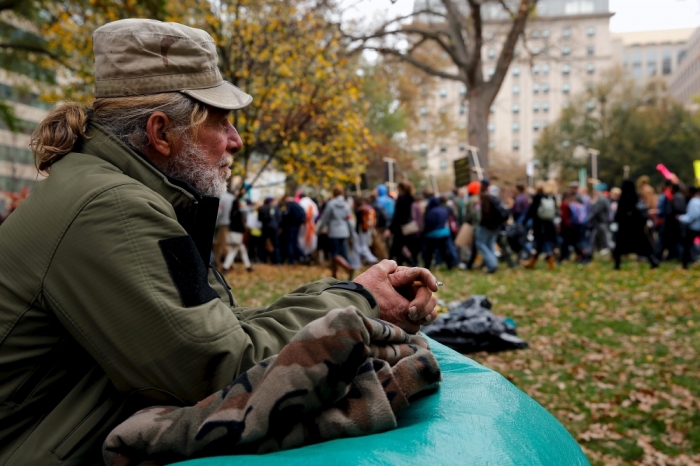Over half of all homeless people may have suffered traumatic brain injury, study finds

Over half of all homeless individuals might have suffered a traumatic brain injury at some point in their life, according to new research that aims to shed new light on the causes of homelessness.
A study compiling research from six high-income countries — Australia, Canada, Japan, South Korea, the U.K. and the U.S. — found that 53 percent of the homeless population had suffered a traumatic brain injury as much as two, three to four times the rate of the population as a whole, according to The Guardian.
If severe enough, such brain injuries could lead to long-term damage, including neurological or psychiatric disorders, according to the study.
The study, published in the Lancet Public Health Journal, also found that a fourth of homeless individuals had moderate to severe traumatic brain injuries, or 10 times the rate found in the general population.
“The relationship between homelessness and TBI could function both ways — TBI could increase the risk of homelessness, and homelessness could increase the risk of TBI,” researcher Jehannine Austin said. “We need a better understanding of this relationship to address the issue, and to improve outcomes in the homeless and marginally housed population.”
The authors looked at existing studies that included people of any age who were either homeless, in unstable housing situations, or seeking services for homeless people, according to the Medical Xpress newspaper.
They also examined the number of new cases and existing cases of TBI, and the association between TBI and health or functioning outcomes.
Based on their findings, the authors of the study call for healthcare workers to have increased awareness of the prevalence of TBI in people who are homeless. They suggest that a more comprehensive assessment of their health, such as checking for history of TBI, might improve their care.
Lead author Jacob Stubbs, University of British Columbia, Canada, says: "Traumatic brain injury may be an important factor in the complex health challenges faced by this population. Our work emphasizes that healthcare professionals and frontline workers should be aware of the burden of TBI in this population, and how it relates to health and functioning."
The study corroborates earlier research compiled by the American Psychological Association revealing that approximately half of the homeless population has sustained a traumatic brain injury. TBI-related cognitive and behavioral deficits lead to an increased risk for economic and housing instability, according to the research.
Additionally, those who suffer from a TBI are more susceptible to substance abuse-related accidents and victimization from violence.
There are an estimated 553,742 people in the U.S. experiencing homelessness on a given night, according to statistics from the National Alliance to End Homelessness.
Susie Jennings, CEO of Operation Care International, a faith-based nonprofit organization serving thousands of homeless, destitute, and low-income families in the Dallas-Fort Worth area and around the world, told The Christian Post that she started the ministry after her own husband ended his life after a long battle with mental illness.
“At that point, my anger became directed at God,” she said. “But one night, He gave me a dream. In it, I saw myself knocking on my neighbor’s door, telling them about Jesus. That morning, I woke up and I decided to choose joy. I said, ‘God, what can I do for you?’”
Many of the homeless individuals that seek the assistance of Operation Care, Jennings said, are dealing with trauma issues, medical issues, and mental health issues. Oftentimes, she said, they eagerly embrace the hope-filled message of the Gospel.
“We are an evangelistic street ministry,” she said. “We provide the physical and spiritual needs of the homeless and poor. While giving them gifts, we tell them about the greatest gift of all, and that is Jesus."
“Homelessness is a very hard thing to minister to because so often, they’re gone the next day,” Jennings added. “But if one life is changed, I’d do all the work a million times over. Jesus left 99 for one.”




























